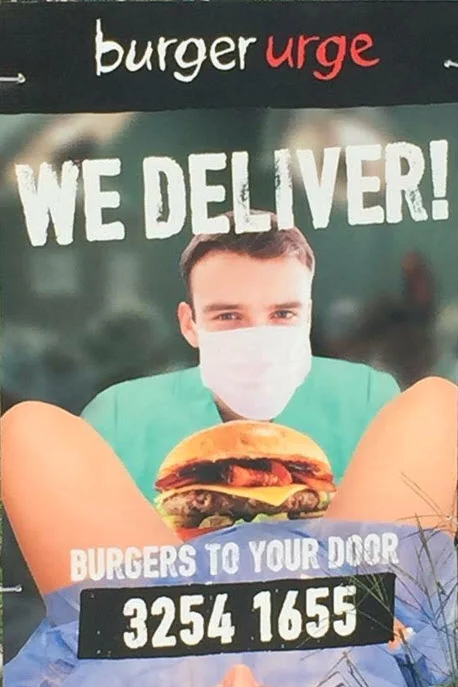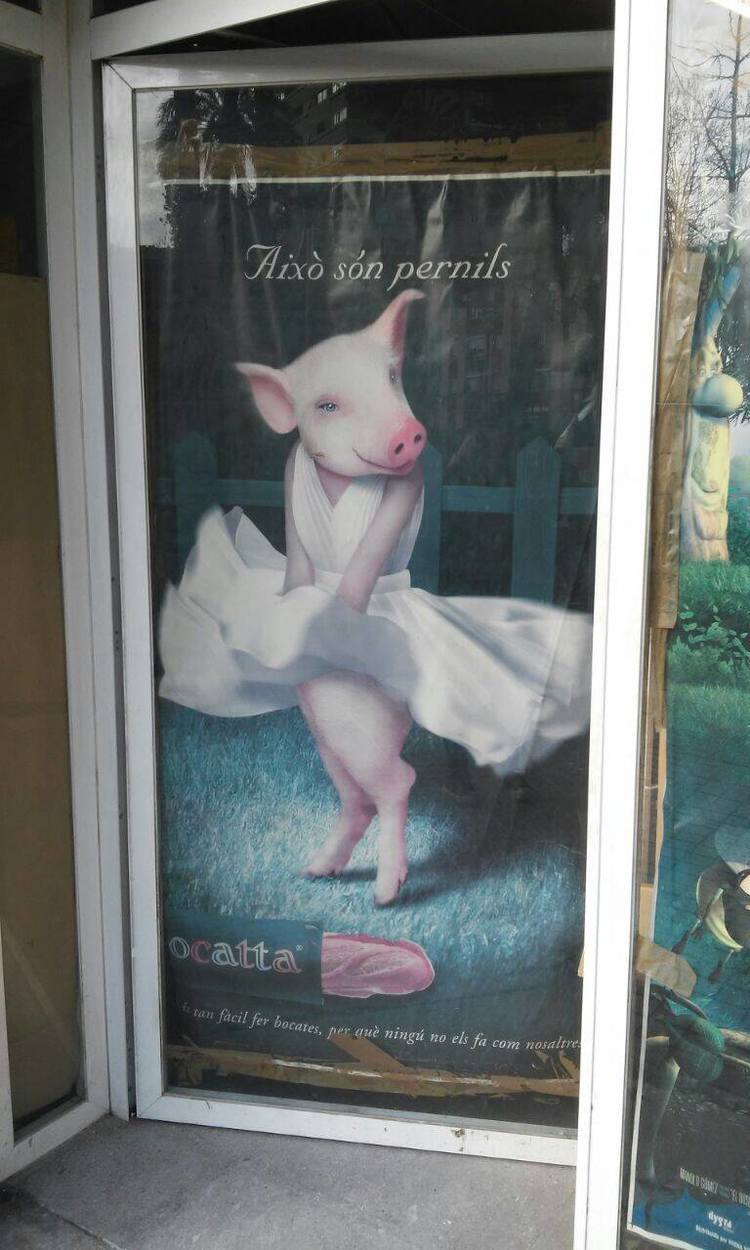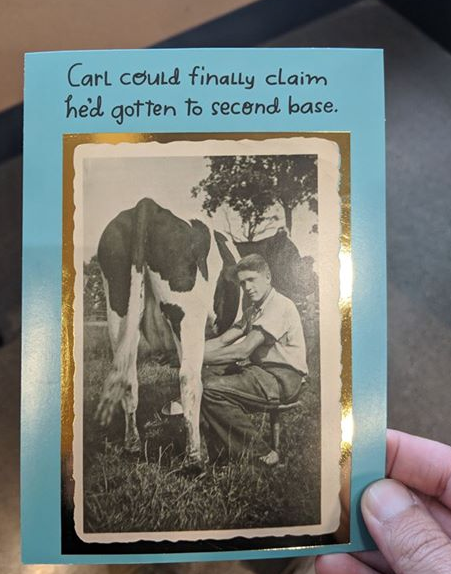


Image source: https://caroljadams.com/examples-of-spom/
I chose the pictures above because I found them to be the most cringe-worthy pictures out of the slideshow of cringe-worthy pictures. The first one on burger urge features a white male doctor helping deliver a burger as substitute for a baby. I’m honestly still GAGGING. The pun is being able to deliver food right to your doorstep.
The second picture features a pig in a popular Marilyn Monroe pose- the pig even wears the white dress. GAG.
The third picture is of a picture. Carl could finally claim he’d gotten to second base. Our white male friend, Carl, is milking a cow. Milking. A. Cow. GAGGGGGGGGGGGGGG! I’m actually sick. (And I’m not even vegan!)
These pictures work to enforce the narrative the women can be associated to animals in a sexual sense. By sexualizing these animals, popular media (controlled majorly by white cis men) objectifies women in that same notion. Women are seen less as people, humans, and more as objects.
This is not new information.
If you are a woman, you know.
For women, these are terribly oppressive ads that have circulated Western media for decades. For Black women, this can be fatal. Already, Black women are the most vulnerable people in America. They face several intersecting systems of oppression that feminist author Carol Adams doesn’t cover in The Politics of Meat. By further objectifying Black women, misogynist men are able to justify their physical and mental attacks on the oppressed minority.
Adams does highlight some origins to the women/animal associations. In one out of her nine feminist-vegan points, Adams says:
“Female animals are the absent referents in meat eating and in the consumption of dairy and eggs. There would be no meat eating if female animals weren’t constantly made pregnant. Female animals are forced to produce feminized protein, (plant protein produced through the abuse of the reproductive cycle of female animals, i.e., dairy and eggs).”(Adams, 13)
Through unpacking this point, I am led to believe that because female animals can produce, just like female humans can, therefore they could be easily associated with one another. Moreover, the manhandling of women could be justified by the manhandling of animals. I don’t know if anyone else is reading it the way I am but this is just ludicrous reasoning. And yet, our society bought it, time and time again.
“Consumption is the fulfillment of oppression, the annihilation of will, of separate identity.” (Adams, 14)
Those who watch advertisements, commercials, and billboard ads are consumers. They take in the images and associations, many internalizing them without challenge. THAT is the problem. Mass consumers are easily influenced when it comes to pop culture and media. Why aren’t people being taught to be socially conscious on a national scale? Why are we not being taught until college to critique and examine advertisements? Why have we let this problem linger? I feel like I’m ranting at this point.
All in all, I didn’t very much enjoy the perspective of this feminist. Maybe it’s because I am not a vegan, I am not an expert in eco-feminism, and I am not white. Carol Adams brings forth a privileged narrative whereas underprivileged communities cannot afford an alternative, more eco-friendly diet. I also believe that this narrative ignores the perspective of Native American women who have fought to protect their lands and the nature within them while still hunting for food in a sustainable way. She touches upon black women who represents a wild animal in contrast to a white women representing a slutty animal but I believe this deserves further unpacking. (16)
I don’t see the biggest issue as being the treatment of animals, eating a cow that could’ve been your pet pony, etc. I do believe that animals deserve better treatment. And if you refer to my last blog, I enforce the narrative the animals belong in nature, not in confined spaces. However, it bothers me how Adams never mentioned how this internalization affects women, in particular Black women surrounded by Western culture. They are targets because of this messaging. And we need to publish narratives that empower them, that show that they are beautiful and powerful, just like animals, just like nature (if that association has to be made at all.)
Everything in love,
Cece X
P.S. please inform me if I come off as threatening or confrontational, that is no my intention!
I think it’s funny that you apologize for your tone in this blog. I went so hard this week I hope at least someone found it confrontational, because this topic is infuriating. As someone who does not want to sexualize animals, I would have to agree with your use of the word ‘gag’, as looking at these images does feel revolting due to the way that these animals are depicted through misogyny. In Carol Adams’, The Politics of Meat, explains this gagging feeling through the quote, “How do you make a person less of a human? Two of the most predictable ways are to make a person or a group of people into (false) mass terms and to view them as animals.” (7) This idea can most easily be seen through your image of the pig. The pig is parodying the Marilyn Monrow pose as you noted, but the original image is very provocative, making the piece degrading to her. Similarly, in Lisa Kemmerer’s The Pornography of Meat, she states “Advertisements contain all that we imagine to be good and powerful on the side of white males, juxtaposed against all that we hold in low esteem.” This idea ties in well with your third image, of the boy milking a cow. The white man in the image holds the power, while the cow is sexualized for performing an act that the cow needs to stay healthy.
Hey Cece, I really enjoyed your blog post and you opened my eyes to a lot of things that I hadn’t truly thought about. In particular, the idea of Native American history as well as impoverished communities of color. While as you said Adams does glance over the topic of race and the distinction between black and white women I do see your point that it is important to talk about this idea of who or what is “desirable.” Although, I do not believe women and animals should be viewed as comparable it is important to note that animals that represent black or white women are also not comparable. The author showcases this by stating “pigs are often depicted…as white women…if the pig weren’t white, there would be less of an anthropocentric hook…if a dark pig were used, it would have overwhelmed the anthropornographic staging of the photo. ” (Adams 17). Thus, one can argue that often more times than not these advertisements use images which promote white beauty/ sexuality. As a result, they not only reinforce sexist views, but also racial ones. I am wondering if these images not only display privilege for heterosexual men, but also in some strange way white women as well? Does the category of what kind of meat we are classified and portrayed as matter? And if so what kind of conversation does it lead to? Have Ecofeminist fighting for the liberation of animals and women explored this topic and have we just not read about it or has it been ignored as a whole? Again, great post it truly opened my eyes to a whole other side to the topic.
Hi Cece,
As always here I am on your blog to spark conversation. I would just love to say as a black woman I appreciated your intake in a different perspective. I was so worried about the animals that I didn’t even realize her perspective wasn’t for black women. Although I love your intake I wanted to ask how you felt about what she was saying about the animals? For me it’s really upsetting and I’ve decided after this week I’m going to try to be vegetarian again after so long of not being one. I keep looking at my dogs at home and getting irritated. How could I cuddle and love them and eat other little animals gag I can’t.
The pictures you chose made me cringe so hard I was so uncomfortable with the first advertisement, who even allowed that to get printed? Unfortunately we couldn’t meet in class to pull this post apart but I enjoyed it and hopefully we can continue it on this blog.
xoxo Gossip Girl